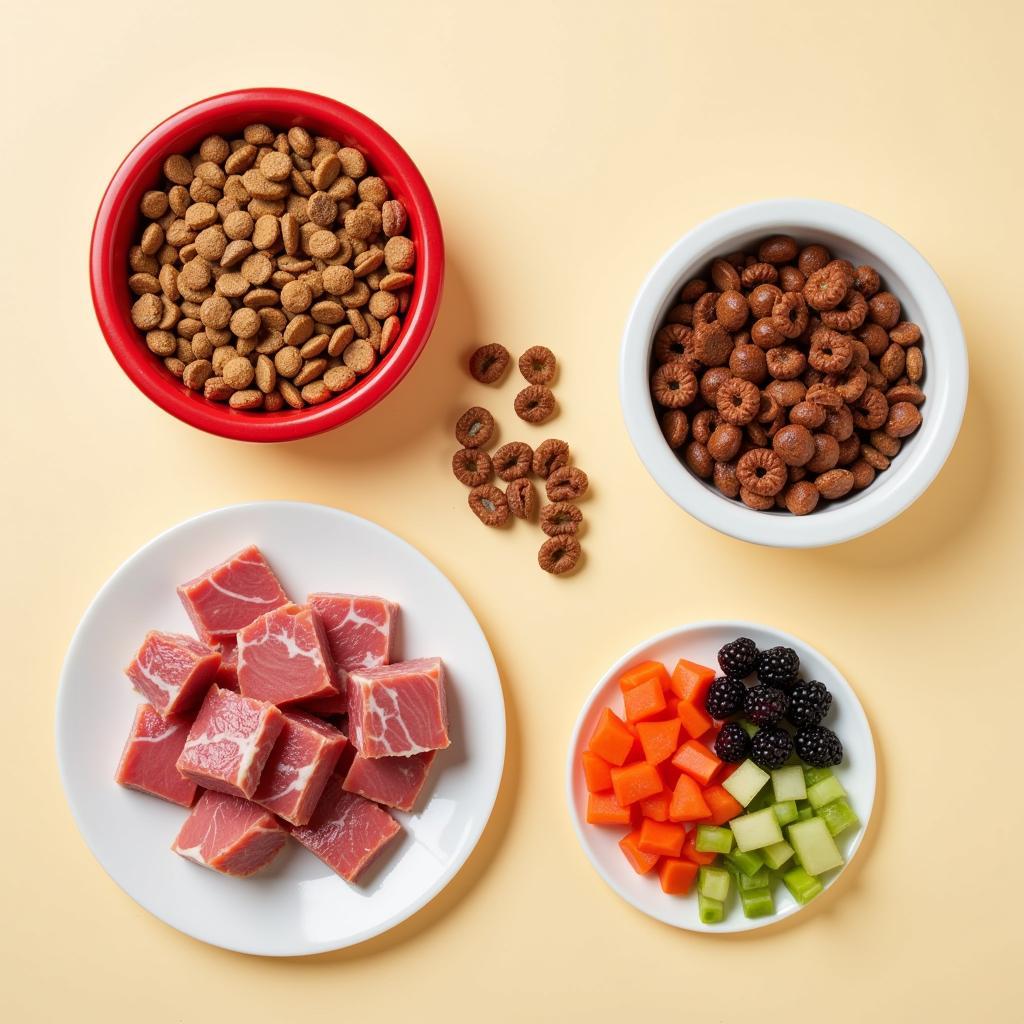Picking the right Loyal Puppy Food is crucial for your furry friend’s growth and development. Just like human babies, puppies need a specific balance of nutrients to thrive. But with so many brands and formulas on the market, finding the best food for your loyal companion can feel overwhelming. Don’t worry, we’re here to help you navigate the world of puppy nutrition!
Decoding the Puppy Food Label
The pet food aisle can feel like a maze of confusing terms and ingredients. Don’t fret! Here’s a quick guide to deciphering those labels:
- Life Stage: Look for food specifically labeled for “puppies” or “growth.” These formulas are tailored to meet the higher caloric and nutritional needs of growing dogs.
- Ingredient List: The first few ingredients are the most important. Look for high-quality protein sources like chicken, fish, or meat meal as the primary ingredient.
- Guaranteed Analysis: This section lists the minimum percentages of crude protein, fat, fiber, and moisture. Puppies need higher levels of protein and fat compared to adult dogs.
- AAFCO Statement: The Association of American Feed Control Officials (AAFCO) sets nutritional standards for pet food. Look for a statement indicating the food is “complete and balanced” for puppies.
Key Nutrients for Growing Puppies
Your puppy’s diet should provide a delicate balance of essential nutrients to support their rapidly developing bones, muscles, and organs. Here’s what to look for:
- Protein: Essential for building and repairing tissues, protein should be the foundation of any good puppy food.
- Fat: A concentrated source of energy, fat also supports healthy skin and coat.
- DHA: Docosahexaenoic acid, an omega-3 fatty acid, plays a vital role in brain and vision development.
- Calcium & Phosphorus: These minerals work together to build strong bones and teeth.
Different Types of Puppy Food
Puppy food comes in various forms, each with pros and cons:
- Dry Kibble: Convenient and affordable, kibble also promotes dental health by helping to scrape away plaque.
- Wet Food: Often more palatable than kibble, wet food is a good option for picky eaters or puppies with smaller appetites.
- Raw Food: This diet consists of uncooked meat, bones, fruits, and vegetables. While proponents tout its benefits, raw feeding requires careful preparation and handling.
 Variety of Puppy Food Options
Variety of Puppy Food Options
How Much and How Often Should I Feed My Puppy?
Puppies have different feeding needs depending on their breed, age, and activity level. Consult your veterinarian for personalized feeding guidelines, but here’s a general rule of thumb:
- Small Breeds: Feed 3-4 times a day.
- Medium Breeds: Feed 3 times a day.
- Large Breeds: Feed 2-3 times a day.
Avoid free-feeding, as it can lead to overeating and obesity. Always have fresh water available for your puppy.
Transitioning to Adult Dog Food
As your puppy approaches adulthood, typically around 12-18 months of age, you’ll need to gradually transition them to adult dog food.
- Start Slowly: Begin by mixing a small amount of adult food into your puppy’s regular food.
- Gradual Increase: Gradually increase the proportion of adult food over 7-10 days.
- Monitor Your Puppy: Watch for any digestive upset, such as diarrhea or vomiting, during the transition. If you notice any issues, slow down the transition or consult your veterinarian.
Choosing the Best Loyal Puppy Food: Factors to Consider
- Breed Size: Large breed puppies have different nutritional needs than small breeds. Look for food formulated for their specific size.
- Activity Level: Highly active puppies require more calories than their laid-back counterparts.
- Health Conditions: Some puppies may have food sensitivities or allergies. If your puppy has special dietary needs, consult your vet.
- Your Budget: Puppy food prices vary widely. Determine your budget and choose the highest quality food you can afford.
Loyal Puppy Food: Making the Right Choice
Feeding your puppy a nutritious diet is a foundational act of love and care. By understanding the basics of puppy nutrition and carefully considering your puppy’s individual needs, you can make informed decisions about the best loyal puppy food to help them grow into healthy, happy adult dogs.
For more information on specific dog breeds and their dietary needs, check out our articles on:
Remember, your veterinarian is your best resource when it comes to your puppy’s nutrition. Don’t hesitate to reach out to them with any questions or concerns.